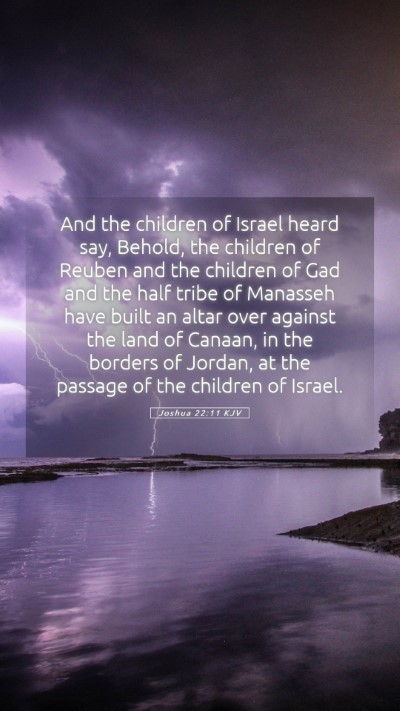Bible Verse Commentary: Joshua 22:11
Verse: "And the children of Israel heard say, Behold, the children of Reuben and the children of Gad and the half tribe of Manasseh have built an altar over against the land of Canaan, in the borders of Jordan, at the passage of the children of Israel." (Joshua 22:11)
Summary of Bible Verse Meaning
Joshua 22:11 describes a significant moment when the Israelites learned of an altar constructed by the tribes of Reuben, Gad, and the half tribe of Manasseh. This event is critical as it sparked worries among the Israelites, which reflects broader themes of faithfulness, unity, and governance in the community.
Insights from Public Domain Commentaries
-
Matthew Henry's Commentary
Matthew Henry emphasizes the concern that arose from the building of the altar. He notes that the construction of the altar was perceived as a potential act of rebellion against God’s established worship at Shiloh. The author highlights the importance of maintaining unity and adherence to God’s commands among the tribes of Israel. The alarm expressed by the rest of the Israelites serves as a reminder of the need for vigilance in matters of faith and community.
-
Albert Barnes' Notes
Albert Barnes explains the historical context surrounding this verse, elaborating on how the two and a half tribes, who settled on the eastern side of the Jordan River, faced scrutiny from the remaining tribes. Their altar was a symbol that could easily be misconstrued, potentially indicating a break from the central worship at the Tabernacle. Barnes stresses the importance of communication and clarification in maintaining solidarity among believers, illustrating how misinterpretations can lead to conflict.
-
Adam Clarke's Commentary
Adam Clarke provides a more detailed analysis of the cultural and religious implications of the altar. The fear of rebellion stemming from this action illustrates Israel's fragile unity post-conquest. Clarke ties this to the importance of collective worship and loyalty to God, arguing that the altar's misunderstanding could lead to a breach of covenant fidelity. He emphasizes the need for patience and dialogue to avoid escalating tensions within the community.
Key Themes and Applications
This verse touches on several relevant themes for contemporary readers:
- Unity and Division: The reaction of the other tribes shows how quickly unity can be threatened by misunderstandings. It serves as a warning to modern believers about the importance of fostering harmony and open communication within the church.
- Faithfulness to God's Commands: Building the altar was a direct challenge to the worship of God as prescribed. This speaks to the importance of adhering to God’s instructions in personal and communal worship.
- Communication and Verification: Rather than jumping to conclusions, the Israelites needed to investigate and understand the motives behind the altar's construction. This teaches the value of addressing concerns through discussion and seeking clarity instead of assuming the worst.
Cross References
For further understanding and context, consider these related verses:
- Deuteronomy 12:5-14 - Discusses the importance of worshiping in the place God chooses.
- Joshua 22:26-27 - Describes the purpose of the altar as a witness to future generations.
- 1 Kings 12:25-30 - A similar concern arises regarding the establishment of altars outside of Jerusalem.
Conclusion
The examination of Joshua 22:11 provides valuable Bible study insights into how misunderstandings can arise within a community of faith. This verse, along with scholarly Bible verse interpretations, highlights the importance of clarity, unity, and faithfulness to God's commands as foundations for harmony among believers. In your Bible study groups or online Bible study, consider how these principles apply to your own community and daily interactions.


